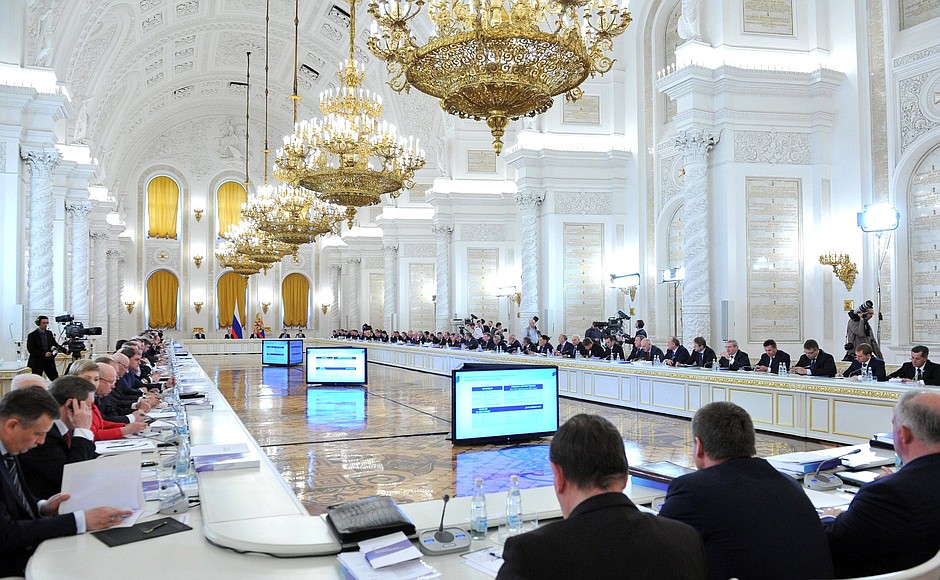
The subjects on the agenda include making state support for small business more effective, giving entrepreneurs greater access to credit resources, settling human resources issues, tax and legal issues, including labour relations, and procedures for inspections by supervisory agencies.
* * *
President of Russia Vladimir Putin: Good afternoon, colleagues,
On our agenda today is a matter that is generally important, but in the current situation, it has acquired special economic, social and public significance. The development of small and medium-sized businesses is one of the key conditions not only for the renewal of this country and its economy and for enhancing stability, but for its successful overall progress, for the achievement of the enormous creative business potential our people clearly posses.
Due to their mobility, small and medium-sized businesses can quickly occupy vacant spots on the market, create new points of economic growth, assist in efficient economic growth and create new jobs. I would like to add that private businesses are becoming ever more active in the social sphere as well.
Overall Russia has created the organisational and legal basis to support small and medium-sized businesses, including simplified taxation, a system of start-up grants, micro-loans, securities and loans on easy terms. Small and medium-sized businesses are receiving greater access to procurement plans of state-owned companies and companies with the state as a shareholder. In the past years, we have truly managed to improve the business climate. At the same time, small and medium-sized businesses are still developing slowly. These are mainly self-employed individuals and micro-companies and their contribution to the nation’s GDP does not exceed 21 percent.
For comparison, as you may all know, in other economically developed countries this share is in excess of 50 percent, while in this country it is only 21 percent. Their share in the overall turnover of goods and services is only 25 percent. Capital investment here is also very low – only 6 percent of its total share nationwide. We can see that people are hesitant to start their own businesses. Thus, only 6 percent of our citizens are beginning entrepreneurs or start-up owners.
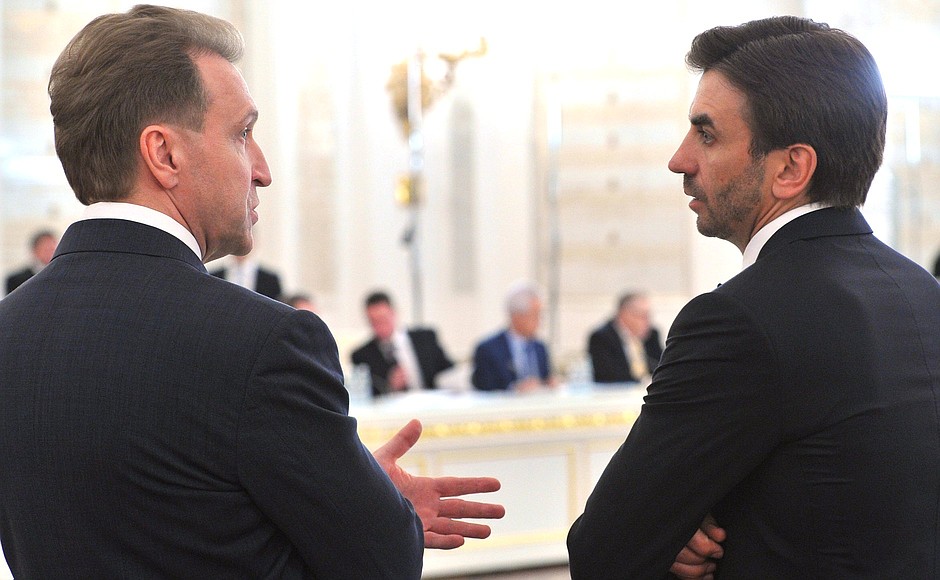
What do the young people prefer now? We all know this very well too: they prefer jobs in the civil service, municipal authorities or major companies with public ownership. Moreover, a tendency has developed for workers to leave their jobs at small and medium-sized businesses. At the same time, experts are noting increased employment in the informal economy.
Naturally, business requires determination, special knowledge, persistence and the ability to promote one’s ideas and projects. There are many such people in Russia, of course. However, what does it mean if they are reluctant to make use of their capabilities, to start their own business and thereby raise their living standards?
It means that the risks and obstacles are greater than the incentives and opportunities. It means that there are no clear predictable rules, while the support is not efficient or accessible enough. Obviously, we need complex measures that would apply to all small and medium-sized businesses and that would provide real support and unconditional stimulation of private business initiative.
Colleagues,
I would like to focus on a number of areas that I find most important. It is of principal importance to establish the values of entrepreneurship in society, to spread the understanding of the special role of entrepreneurs as one of the most important resources for this nation’s development and its long-term economic growth.
The state and all levels of authority should do everything possible to make business attractive, accessible and prestigious. We have to create equal conditions for all businesspeople, make sure the rules and laws are stable and clear, ensure honest and open competition, and make sure nobody stands in their way, nobody forces protection rackets on them, nobody extorts bribes or offers any kind of imposed services.
What I am going to say now is probably the most important thing – and the simplest one. The creation of a favourable business environment in every region and municipality all over Russia is the key to the development of small and medium-sized businesses. If we do not have this, no benefits, preferential terms or grants would help. We have to create a favourable business environment.
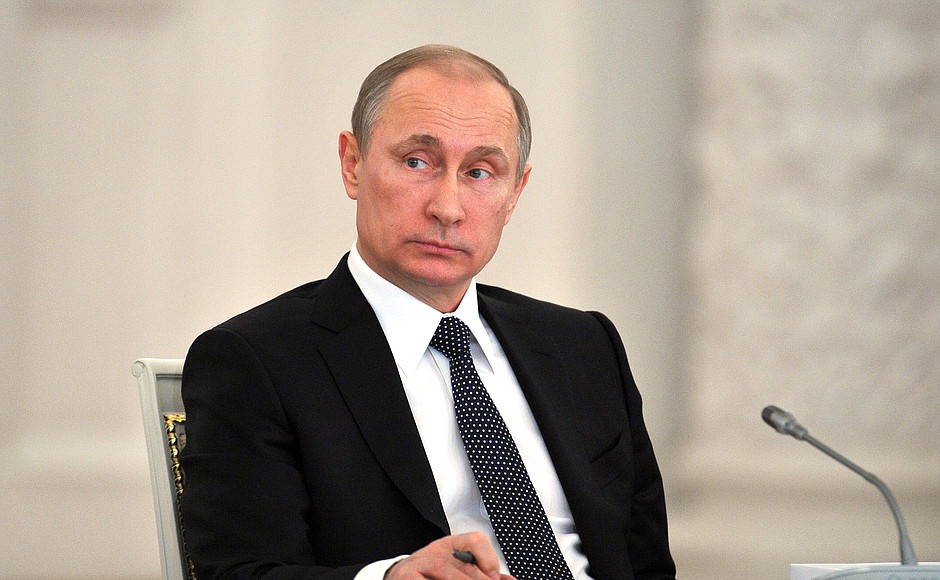
I would like to ask heads of regions to responsibly approach this task and set their teams for productive work, without pushing this aside as something unimportant. You know better what needs to be done on your territory to create a more comfortable business climate. You should get directly involved in these efforts, show initiative and maintain a constant dialogue with the business community.
I will get to this later in detail, but it is obvious that we need to create corruption-free, transparent mechanisms for interacting with businesses. This is the most important factor that shows the professional worth of the management team. I would like to stress that, according to polls, a significant number of companies still find administrative barriers a heavy burden. I believe that we have to analyse the current state of affairs in every region honestly, without any reference to the existing difficulties. We should not do this merely to report, but remove all the obstacles standing in the way of businesses for the benefit of the cause, for the nation and its people.
For instance, we have long been talking about the need to give businesspeople access to infrastructural resources. This means both transparent rules of access to gas and other grids and the ability to use unused public or municipal property on easy terms. However, this has not been done everywhere and businesspeople continue going door-to-door asking officials to grant them permission to things they should have easy access to. As a result, businesses are stalled and business initiative dies down.
I would like to repeat that the main thing now is to give people freedom, give them an opportunity to fulfil their potential and to support their desire to arrange their own lives and be of use to their country. I will repeat that these targets have to be reached together with businesses, with the media, political parties and public unions. Our joint efforts should result in a significant growth of the share of small and medium-sized businesses in the economy and the creation of new jobs in this sector. Currently these businesses employ 18 million people. I believe that in the next five years we have every opportunity to ensure a significant growth in the share of small and medium-sized businesses in our economy.
This is a key task for authorities at all levels. Therefore, the government and the regions of the Russian Federation, as I would like to stress, should set up special departments, and as I have already said, specific individuals have to be made personally responsible for meeting this target.
I would like to reiterate the idea that all these mechanisms should be transparent. We do not need to create structures to work with businesses by means of extortion or by making anyone uncomfortable.
The key is transparent mechanisms for dealing with businesses that would be clear to all and would be controlled by society. This is a continuous job. I would also suggest developing precise targets both regionally and on the federal level with specific deadlines and timelines.
Colleagues,
The State Council working group discussed practically all the issues that concern businesspeople today. The report covers them all in detail. One key topic is the need to create an effective mechanism for the development of small and medium-sized businesses. The appropriate institutions are obviously not fully coping with the task of providing financial, legal and methodological assistance to small and medium-sized businesses.
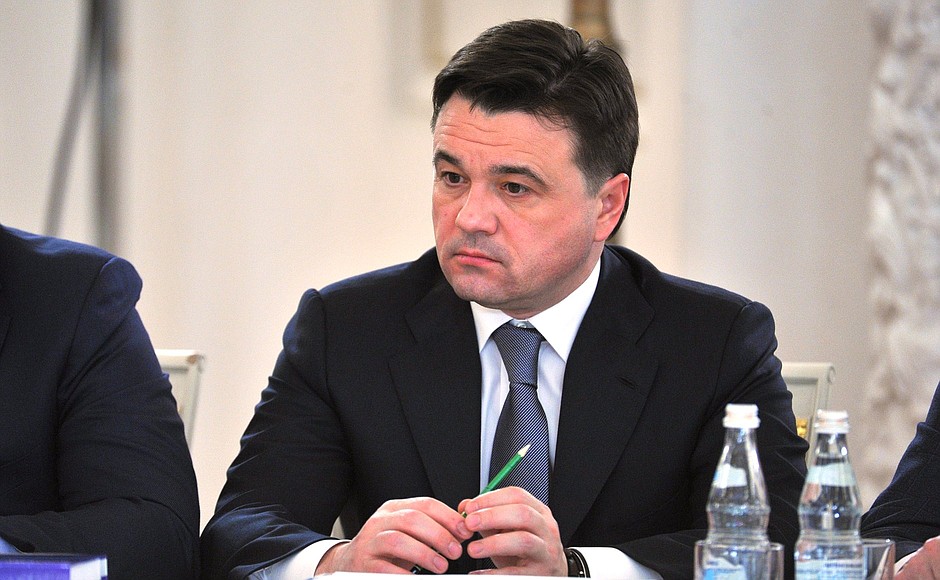
Besides, we need to specifically resolve such issues as attracting loans and investment and access to orders by public companies. I would like to ask all the speakers to go into greater detail here.
The working group suggests simplifying the procedure for starting up a small business. I fully agree with this. It should be easy to start a business, and one should not fear taking risks or making mistakes. One should not waste time and energy collecting references and certificates. Simply buy a patent and start working. The working group has come up with a variety of proposals, including one to spread the two-year-long tax holidays to all individuals starting up their own businesses.
I would like to remind you that as of January 1 we have introduced this new rule – the two-year tax holidays for all businesses and self-employed individuals who would like to try working in this capacity again. Could we do this for small and medium-sized businesses?
We clearly would like to find the most efficient support mechanisms. However, let us be realistic. There exists the danger that people would set up a company for two years, and after that, they would set up a new one. We have to consider this in the light of the realities, of the existing practice.
There have been other proposals as well. We will consider everything that would benefit the development of small and medium-sized businesses. All these proposals are clearly directed at one goal – to create greater opportunities for every person who would like to take an active part in the nation’s economic development.
As I have already said, we also need to consider ways of making loans more accessible. Clearly, the current interest rates are unacceptable for businesspeople. We keep returning to this in our daily work with the Government and the Central Bank, everybody is aware of the issues. This is no secret.
If these are the rates we have now, some activities should be subsidised. This is clear. All we need to do is consider the existing realities in the economy and align our entire financial, tax and economic policy accordingly.
I would like to remind you that we agreed to fix the existing tax benefits for the next four years. However, new payments have appeared due to the introduction of the cadastral value of real estate and property. I believe the regions should be reasonable here, there should be no radical increase of the tax burden for businesses, especially for companies involved in production and occupying large premises. I have already indicated this to the heads of some regions; however, I have not yet seen any principal change.
There exists a general rule: a law does not have a retroactive effect. We introduced a new appraisal system and spread it to all the rental agreements entered into by businesspeople earlier. We often argue with our European colleagues over the so-called Third Energy Package and we believe (and we make this public) that this way of conducting business, when decisions are made and then are retrospectively applied to all contracts and agreements, is absolutely uncivilized.
However, inside this country we are doing the same thing now. Businesspeople calculate their costs proceeding from the situation that exists when the contracts are entered into, or say, when rent agreements are signed. Then, all of a sudden, they need to reassess their costs by marking them up. Let us take a better look at this. I would like you to proceed from economic efficiency here.
Regarding inspections by controlling agencies, all instructions have already been issued. I would like the Prosecutor General’s office to analyse the validity of the inspections conducted in 2014, primarily the unscheduled ones.
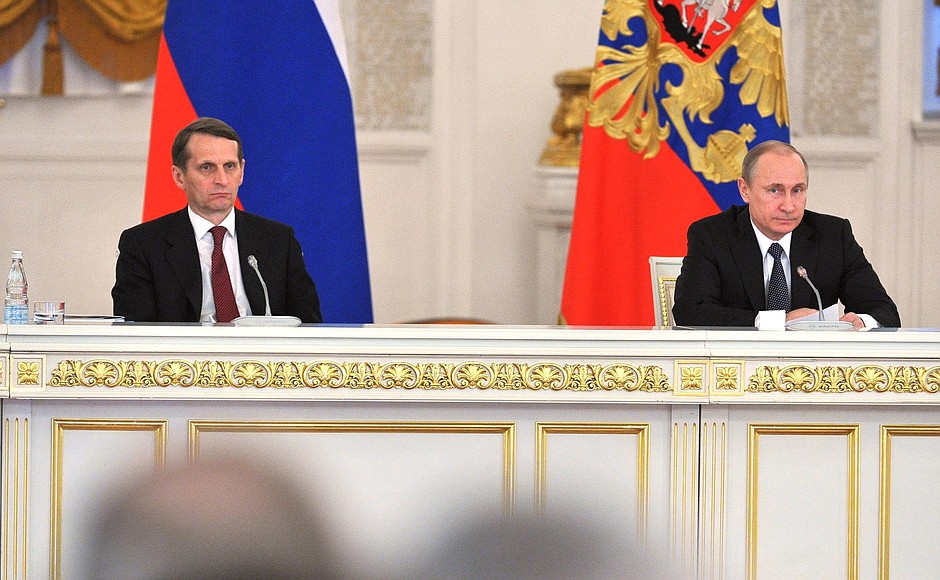
Businesspeople should not live in constant fear that another inspection can occur any time and that any actions of theirs could be made subject to some fine or penalty. We need to admit that the existing regulatory base needs improving, and I suggest carefully analysing it all again.
Colleagues,
I have only singled out part of the issues we will be considering. The development of small and medium-sized businesses is a multi-faceted topic. A seemingly insignificant issue could turn into a serious obstacle for businesspeople in their work. Therefore, we need to take everything into consideration, analyse everything and draw conclusions to ensure that there are no loopholes that would allow authorities or bureaucrats at any level to ill-treat businesses.
We have to do everything necessary to make sure our businesspeople can fully demonstrate their potential. It is of vital importance for the country, for all of its regions that Russian companies occupy their rightful place both on the home market and at world markets.
Let us proceed with our discussion.
<…>
Vladimir Putin: Colleagues,
I would like to thank you for your active participation in today’s work and to note that some of the proposals made in the course of the discussion have already been worked into the draft instruction, however some have not. Therefore, I would like to ask the Government and the Presidential Executive Office to make an extra effort to make sure it is all reflected in the instruction I have just mentioned.
In conclusion, I would like to say this: it was no accident that I asked you all to come here to Moscow, to the Kremlin to discuss these matters. The situation is such that it requires additional urgent efforts to develop Russia’s own economic base. Small and medium-sized businesses cover all spheres of activity: trade, production and high technologies. This requires your special attention.
I would like to call on not only the Government and the Executive Office, with whom we are regularly working on this, but also on the heads of Russia’s regions – a lot depends on you.
We have been saying that we need to create additional support instruments and mechanisms on the federal level, but the same mechanisms to support small and medium-sized businesses should be created in the regions. I would once again like to ask you to give all your attention to everything we discussed here and, most importantly, to put it all into practice.
Thank you.